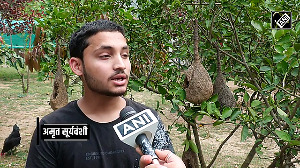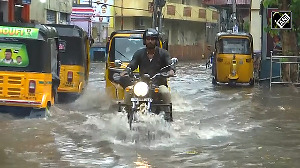The 93-minute long mock documentary looks at an America undergoing great changes following the assassination of President George W Bush by an unknown assailant in Chicago in 2007.
Many have criticised the festival, now in its 31st year, for showing the film, especially on the eve of the fifth anniversary of the 9/11 terrorist attacks.
But Noah Cowan, co-director, TIFF, has steadfastly defended the film's inclusion, calling it a brilliant piece of art that asks provoking questions about the human condition in the context of a state of war.
"The Toronto International Film Festival is committed to the free expression of ideas and to engaging audiences in thoughtful discussion about issues of the day," Cowan said. "DOAP contributes meaningfully to the public discourse surrounding current social issues, demonstrates highly original storytelling techniques and utilises innovative digital effects."
The film follows the tradition of great cautionary tales, and is anything but exploitative, he asserted. "It treats what would certainly be a great tragedy respectfully and un-cynically."
The gripping British film, also known as Death Of A President, is directed by Gabriel Range. The film is told like a thriller investigating the murder, and looks at several interconnected issues dealing with the hidden costs of war and the assault on civil liberties. Many critics found it to be one of the best political films made in recent years. Some reviewers have compared it favourably to Costa-Gavras's classic, Z, made more than 30 years ago.
DOAP, which had its world premiere in Toronto, succeeds brilliantly in showing how Washington seeks to 'solve' the murder quickly, and charges a Palestinian, even though there is no evidence of an Arab hand in the assassination.
Range, who was one of the most sought after filmmakers at the festival that has had many eminent directors like Oscar winner Pedro Almodovar, has repeatedly ridiculed the idea that someone may get an idea to actually kill the president. His is a very serious film against assassinations and terrorism, he said. "We portrayed the horror of assassination. I don't think anyone would get the idea of assassinating Bush from this film."
He hopes to finalise a deal by this weekend to distribute the film in America.
The strength of his film, Range says, lies in the fact that it is not sensational. It is a compelling drama, he adds, and has to be seen as a cautionary tale of how politicians misuse public opinion and fear following a crisis.
Why didn't he use a fictional president, he is asked in many interviews. "The minute you have a fictional president, like in 24 or The Sentinel or whatever, it becomes a very different exercise," he said. The impact and urgency is never the same as in his film, he added.
For all those who have been criticising the film without seeing, Range's response is simple: See it the soonest.
The film will be shown on Britain's Channel 4 television next month and after a brief theatrical run, will be available on DVD.







 © 2025
© 2025